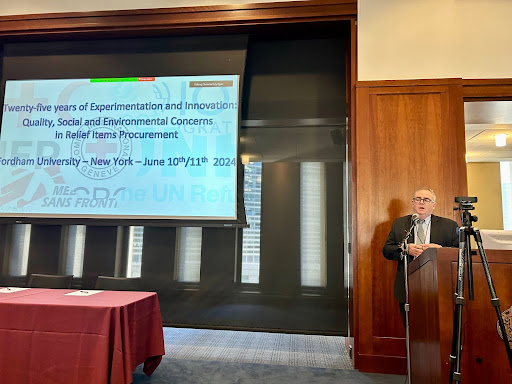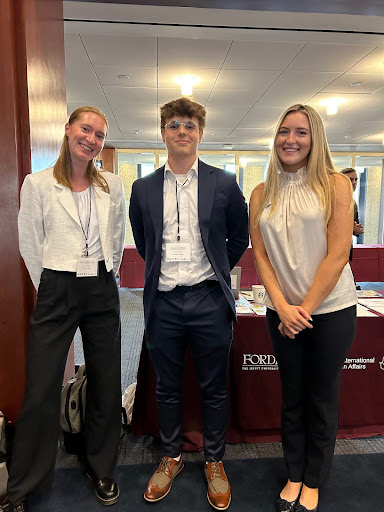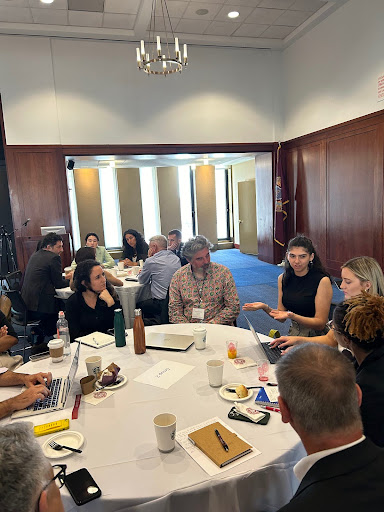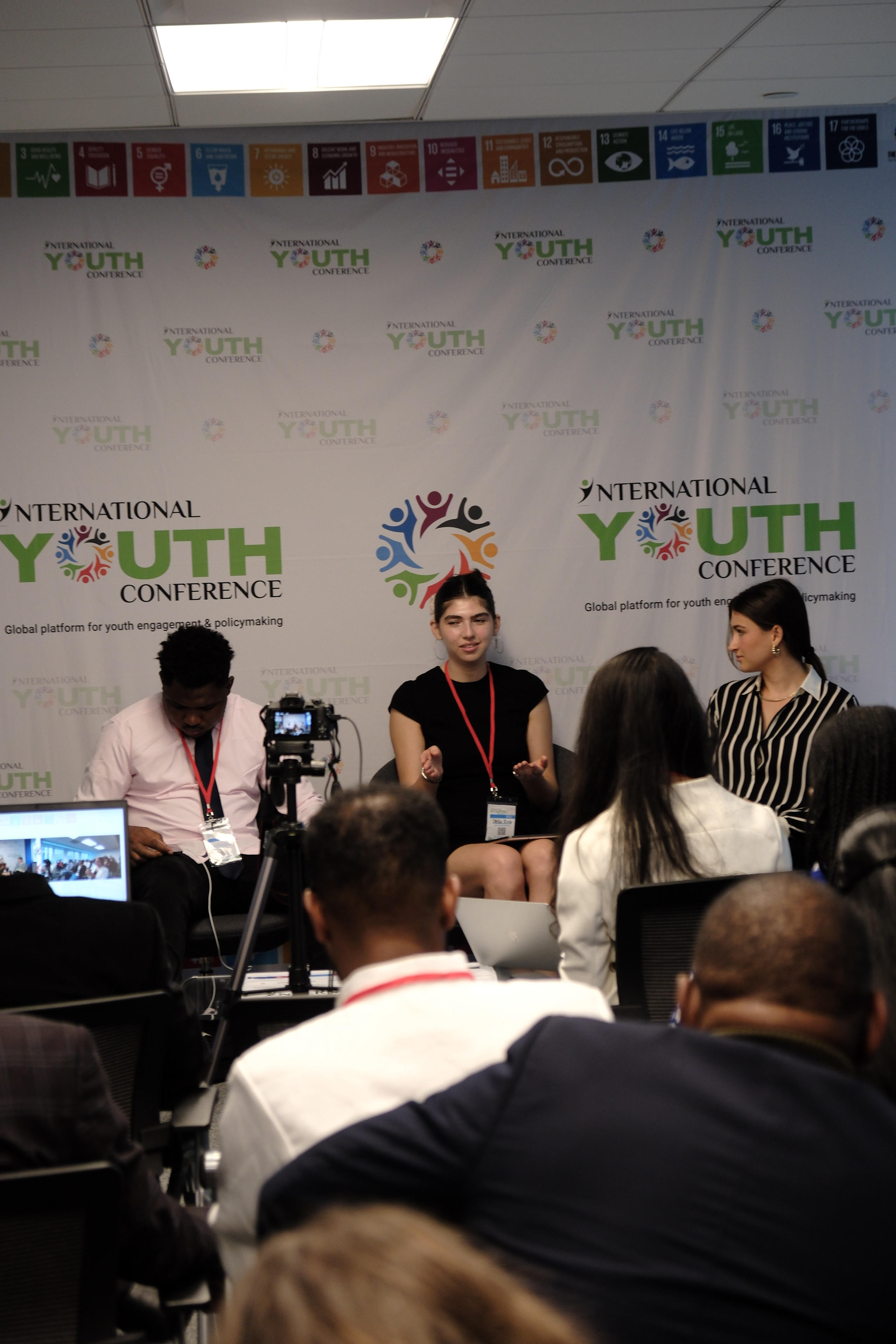News Releases
BRONX, NY - FORDHAM UNIVERSITY’S INSTITUTE OF INTERNATIONAL HUMANITARIAN AFFAIRS FINALIZES MoU WITH IOM - UN MIGRATION AGENCY AND NAIF ARAB UNIVERSITY FOR SECURITY SCIENCES (NAUSS), SAUDI ARABIA
Institute of International Humanitarian Affairs l 2546 Belmont Ave l Bronx, NY, 10458 l (718) 817-5734
FOR IMMEDIATE RELEASE
BRONX, NY - FORDHAM UNIVERSITY’S INSTITUTE OF INTERNATIONAL HUMANITARIAN AFFAIRS FINALIZES MoU WITH IOM - UN MIGRATION AGENCY AND NAIF ARAB UNIVERSITY FOR SECURITY SCIENCES (NAUSS), SAUDI ARABIA
Last week, representatives from Fordham University, IOM, and NAUSS signed a Memorandum of Understanding (MoU), encouraging faculty, staff, and students from all parties to look closely at international migration and migration issues. The MoU will allow interested participants to engage in research, conferences, training, and student opportunities. Representatives who signed the MoU include Ellen Fahey-Smith, Fordham University Vice Provost; Dr. Khaled Alassiri, NAUSS Vice President for External Relations; and Ashraf El Nour, IOM Head of Office in Saudi Arabia.
“The agreement is something that we are all happy about and is not the end but is the start of building and furthering knowledge on migration.” - Ashraf El Nour, IOM
Since 2001, the Institute of International Humanitarian Affairs at Fordham University has - in addition to running the humanitarian studies and training programs at Fordham University - focused on cross-cutting issues, and, today, migration and climate change are key areas.
“This MoU is an opportunity to work with the UN agency, IOM, which focuses on migration as well as a serious Saudi university which is currently looking at migration, especially in that part of the world.” - Brendan Cahill, Executive Director, IIHA.
The topic of migration not only focuses on how and why people migrate but also initiates research and education on border management. The IOM/NAUSS/Fordham University MoU will primarily focus on these areas in Arab countries.
“Now that the MoU is signed, we are looking at the specifics of an upcoming conference, which students and alumni will be invited to attend.” - Brendan Cahill
The MoU was finalized in March 2025 and will last for five years, after which all parties will re-evaluate the future of the agreement.
###
The Institute acts as a bridge between the University and humanitarian practice, hosts lectures and symposia on a regular basis, and is the US partner for NOHA, a consortium of 12 European universities offering humanitarian education. The IIHA at 2546 Belmont Ave, Bronx, New York also provides space for undergrad and graduate students to meet and gallery showings. In addition to our courses, the IIHA publishes on a wide range of humanitarian topics, such as A Skein of Thought. Follow: IG l FB l LinkedIn l X Subscribe: Humanitarian Fault Lines Podcast Media Inquiries: S. Lily Egan

The Institute of International Humanitarian Affairs at Fordham University hosts its first in-person quality, social, and environmental items procurement conference with IOM-UN Migration Agency.
Institute of International Humanitarian Affairs l 2546 Belmont Ave l Bronx, NY, 10458 l (718) 817-5734
FOR IMMEDIATE RELEASE
Institute of International Humanitarian Affairs
Fordham University
Manhattan, New York
12th Floor Lounge
June 10-11, 2024
For two days, sixty-five representatives from interagencies, INGOs, and NGOs gathered to share updates on relief items such as tarpaulins, jerry cans, and mosquito nets - all essential shelter items for those displaced by a crisis. These items are not only necessary for survival but need to be sustainable in order to limit waste. In 2021, it was determined that NFI (non-food items) were only distributed to 32% of the 47.8 million people in need, mainly due to underfunding. The QSE Sub Group sets out to find solutions to this ever growing need that is worldwide.
“We are using our research and development capacity to design new products that are more sustainable by having a different approach on the technical specification, trying to use less resources, adjust our product specification to the result, and to extend the durability of the product to achieve better results.” - Patrick Oger, head of QSE Sub Group and ICRC Project Manager.
Since its founding in 2010, the QSE Sub Group has expanded to six interagencies: ICRC, IFRC, IOM, MSF, UNHCR, and UNICEF. The reason for coming together originated from a factory visit in China by UNHCR and ICRC.
Mr. Oger recalls the visit, “ we found out that we were doing the same job. And we concluded that this requires more collaboration. So, we started this group as a collaborative approach of the supply chain together, UNHCR and ICRC. Then rapidly we included our colleagues. The ICRC stands for the International Committee of the Red Cross and the IFRC, the International Federation of Red Cross at Red Crescent and UNICEF. After some years, we extended the group to MSF, Doctors Without Borders, and IOM, the International Office for Migration, because they were also doing the same work as us with the same type of product.”
The first-of-its-kind-conference included presentations by representatives from the QSE Sub Group, USAID, and Oxfam with a special introduction by Brendan Cahill, Executive Director of the Institute of International Humanitarian Affairs (IIHA) at Fordham University. In December of 2023, Mr. Cahill and Joseph Ashmore, head of QSE Sub Group and Head Preparedness and Response Coordination Support Unit at IOM, met to discuss the possibility of working together on the topic of shelter and hosting a conference this spring. One of the goals of the Sub Group is to involve academia and students, and the IIHA was ultimately selected as an academic partner. Mr. Cahill, expressed the institute’s interest in shelter in his opening remarks, “ At the heart of standards is equal dignity. Human dignity. We're talking about human rights. We're talking about protection in all of its forms and that sits at the very center of the Institute’s mission.”
Although summer break has kicked off for Fordham University’s almost 17,000 students, a group of ten students, alumni, and faculty attended the conference like Lauren Larsen, an International Political Economy and Humanitarian Studies Senior:
“This week, I was privileged to attend “Twenty-five years of Experimentation and Innovation: Quality, Social, and Environmental Concerns in Relief Items Procurement. I learned a tremendous amount about technical specification and harmonization, emerging research and development of new products (like the geodesic tent), sustainability and social considerations to goods manufacturing, benefits and challenges of local purchase, and the importance of quality inspection services. I was grateful for the chance to speak directly with people from various organizations, including those outside of the working group like Catholic Relief Services, USAID, and CARE who have a wealth of experience in the humanitarian sector.”
Throughout the two-day conference, the agenda highlighted unified technical specifications, research and development, sustainability, local purchase, and also five breakout sessions for sharing updates and knowledge and brainstorming solutions to common procurement issues.
While the conference has concluded with many takeaways, the work has yet to finish. A report based on the conference presentations and discussions as well as a video with interviews will be disseminated within the next two weeks.

Brendan Cahill, gives opening remarks Monday, June 10, 2024

Lauren Larsen, Connor Larson, and Ruby Schloss are current Fordham students who attended the conference. Mr. Larson served as the note taker for the QSE report.

Stella Rose, International studies and theology student at Fordham University and Intern at the Nuclear Age Peace Foundation
###
The Institute of International Humanitarian Affairs (IIHA) acts as a bridge between academia and humanitarian practice, hosts lectures and symposia on a regular basis, and regularly participates in and publishes research on today’s global humanitarian issues. The IIHA at 2546 Belmont Ave, Bronx, New York also provides space for undergrad and graduate students and gallery showings. Follow: IG l FB l LinkedIn l X Subscribe: Humanitarian Fault Lines Podcast Read: A Skein of Thought Media Inquiries: S. Lily Egan.
Fordham Humanitarian Studies graduate student invited to speak at UN Youth Panel, 79th UN General Assembly.
 FOR IMMEDIATE RELEASE
FOR IMMEDIATE RELEASE
2546 Belmont Ave, Bronx, NY, 10458
Rose Hill campus
October 2, 2024
Stella Rose missed class for a good reason last week. She was invited to speak on the Youth for Disarmament and Denuclearization panel during the 79th UN General Assembly.
Stella was excited to reference her MSHS class notes during her preparation and used them throughout her talk. She is currently a dual graduate student (Master of Science in Humanitarian Studies and International Relations and Affairs and Theology) at Fordham University.
From her LinkedIn prior to the event:
“Looking forward to high-level week at the United Nations next week has me feeling nostalgic! Reflecting on my statement during the 78th Session of the United Nations General Assembly at the 7th session of the Information and Communication Technology (ICT) Open-ended working group.
It is always such a surreal feeling to actualize my dream of contributing my thoughts at the UN from the youth perspective. Attached below is a copy of my statement stressing that in the Nuclear Age, cybersecurity is critical: not just for the right to privacy but for the safeguards of our weapons systems. In my deliverance, I hoped to highlight pressing issues like cyber warfare, the vulnerabilities of security networks, and the necessary application of the UN Charter and International Humanitarian Law to the possibility of use of ICTs during armed conflicts.
"The threat of nuclear war is subject to the sophistication of security systems that protect weapons software from hacking. These systems are fallible. Softwares for the most sophisticated institutions have endured continued breaches. Relying on luck to prevent accidental nuclear weapons launches is a strategy that continually threatens our existence. I excitedly anticipate this year’s discussions at the 79th session of the United Nations General Assembly surrounding the global effort to accelerate progress towards the 17 Sustainable Development Goals (SDGs), as well as the Summit of the Future.”
During the Event this year at the 79th UNGA:
Stella kicks things off at 6:25 with the basics of nuclear disarmament and the costs our world faces:
“ The cost of maintenance of the nuclear weapons is $91.4 billion. Nuclear weapons are not just an existential threat but a monetary drain.”
On sustainable development:
“So long as the U.S. is going to partake in our modernization efforts throughout the next decade…we are going to see excess amounts of nuclear waste. Nuclear waste is not something we know how to deal with.”
Humanitarian Advocacy and nuclear disarmament:
“We’re putting a much larger emphasis on weaponry than we are on the planet and the people.”
“Making it a public concern is somewhere we can start.”
More on Stella:
- Follow iiha_fordham on IG to watch Stella’s upcoming Day in the Life.
- Contact Stella via Linkedin https://lnkd.in/geCtTfjk or email [email protected].
- Brendan Cahill, Director of Humanitarian Studies, Ruth Mukwana Senior Fellow for the MSHS, and Anne Edgerton Humanitarian Advocacy Professor are also available to speak on Stella’s invitation.
###
The Institute acts as a bridge between the University and humanitarian practice, hosts lectures and symposia on a regular basis, and is the US partner for NOHA, a consortium of 12 European universities offering humanitarian education. The IIHA at 2546 Belmont Ave, Bronx, New York also provides space for undergrad and graduate students to bond during meetings and gallery showings. In addition to our courses, the IIHA publishes on a wide range of humanitarian topics, such as A Skein of Thought. Follow: IG l FB l LinkedIn l X Subscribe: Humanitarian Fault Lines Podcast Media Inquiries: S. Lily Egan.
BRONX, NY - FORDHAM UNIVERSITY’S INSTITUTE OF INTERNATIONAL HUMANITARIAN AFFAIRS FINALIZES MoU WITH IOM - UN MIGRATION AGENCY AND NAIF ARAB UNIVERSITY FOR SECURITY STUDIES (NAUSS), SAUDI ARABIA
Institute of International Humanitarian Affairs l 2546 Belmont Ave l Bronx, NY, 10458 l (718) 817-5734
FOR IMMEDIATE RELEASE
BRONX, NY - FORDHAM UNIVERSITY’S INSTITUTE OF INTERNATIONAL HUMANITARIAN AFFAIRS FINALIZES MoU WITH IOM - UN MIGRATION AGENCY AND NAIF ARAB UNIVERSITY FOR SECURITY STUDIES (NAUSS), SAUDI ARABIA
Last week, representatives from Fordham University, IOM, and NAUSS signed a Memorandum of Understanding (MoU), encouraging faculty, staff, and students from all parties to look closely at international migration and migration issues. The MoU will allow interested participants to engage in research, conferences, training, and student opportunities. Representatives who signed the MoU include Ellen Fahey-Smith, Fordham University Vice Provost; Dr. Khaled Alassiri, NAUSS Vice President for External Relations; and Ashraf El Nour, IOM Head of Office in Saudi Arabia.
“The agreement is something that we are all happy about and is not the end but is the start of building and furthering knowledge on migration.” - Ashraf El Nour, IOM
Since 2001, the Institute of International Humanitarian Affairs at Fordham University has - in addition to running the humanitarian studies and training programs at Fordham University - focused on cross-cutting issues, and, today, migration and climate change are key areas.
“This MoU is an opportunity to work with the UN agency, IOM, which focuses on migration as well as a serious Saudi university which is currently looking at migration, especially in that part of the world.” - Brendan Cahill, Executive Director, IIHA.
The topic of migration not only focuses on how and why people migrate but also initiates research and education on border management. The IOM/NAUSS/Fordham University MoU will primarily focus on these areas in Arab countries.
“Now that the MoU is signed, we are looking at the specifics of an upcoming conference, which students and alumni will be invited to attend.” - Brendan Cahill
The MoU was finalized in March 2025 and will last for five years, after which all parties will re-evaluate the future of the agreement.
###
The Institute acts as a bridge between the University and humanitarian practice, hosts lectures and symposia on a regular basis, and is the US partner for NOHA, a consortium of 12 European universities offering humanitarian education. The IIHA at 2546 Belmont Ave, Bronx, New York also provides space for undergrad and graduate students to meet and gallery showings. In addition to our courses, the IIHA publishes on a wide range of humanitarian topics, such as A Skein of Thought. Follow: IG l FB l LinkedIn l X Subscribe: Humanitarian Fault Lines Podcast Media Inquiries: S. Lily Egan

Experts Across Disciplines Examine Immigration and Border Governance at Multinational Symposium
New York, NY—September 3, 2025
Experts Across Disciplines Examine Immigration and Border Governance at Multinational Symposium Press Contact: Jane Martinez
[email protected] or (862) 216-3388.
Representatives of international organizations, including law enforcement officials, diplomats, government officials, and academics will meet at Fordham University’s Lincoln Center campus on September 9 through 11 to examine the intersection of migration, community engagement, law enforcement, and the psychological impact of migration on communities and security personnel.
A cooperative effort among Fordham’s Institute of International Humanitarian Affairs (IIHA) and the Naif Arab University for Security Sciences, supported by the International Organization For Migrations (IOM), the symposium will also address the integration of artificial intelligence and digital tools in policing, the economic and social impacts of migration on local communities, and successful international models of migration management, with a focus on the link between migrants and the structures and agencies responsible for migration across the mobility continuum.
The symposium is the first project resulting from a Memorandum of Understanding signed by Fordham University, the International Organization For Migration in Saudi Arabia, and Naif Arab University for Security Sciences in March of this year, laying the foundations for academic, scientific, and educational collaboration on topics of mutual interest.
To learn more about the symposium and to RSVP, visit the IIHA's Constant Contact page.
###
Fordham University Founded in 1841, Fordham is the Jesuit University of New York, committed to educating students in the Jesuit tradition to care for the whole person and address the world’s most pressing challenges. With residential campuses in the Bronx and Manhattan, as well as campuses in Westchester and London, Fordham enrolls approximately 17,000 students across its eight undergraduate, graduate, and professional schools, preparing them with sound hearts and strong minds to become leaders who pursue excellence and make an impact in every field from Wall Street to Broadway, in media, law, social service, STEM, and beyond. Institute of International Humanitarian Affairs (IIHA) Fordham’s IIHA is a bridge between the University and humanitarian practice, hosts lectures and symposia on a regular basis, and is the US partner for NOHA, a consortium of 12 European universities offering humanitarian education. The IIHA at 2546 Belmont Ave, Bronx, New York, also provides space for undergrad and graduate students to meet and host exhibitions at our Refuge Gallery. In addition to our courses, the IIHA publishes on a wide range of humanitarian topics, such as A Skein of Thought. Follow: IG l FB l LinkedIn l X Subscribe: Humanitarian Fault Lines Podcast Media Inquiries: S. Lily Egan
Naif Arab University for Security Sciences (NAUSS) Founded in 1978, NAUSS is a premier academic institution dedicated to security sciences, law enforcement training, and capacity-building in the Arab world. Established under the auspices of the Council of Arab Interior Ministers (AIMC), NAUSS plays a pivotal role in developing regional security policies, fostering international cooperation, and integrating advanced technologies such as AI and data analytics into modern policing methodologies in the 22 countries of the League of Arab States. NAUSS provides specialized training programs in border management, counterterrorism, and crime prevention, working closely with law enforcement agencies across the Arab region to strengthen institutional capabilities in security governance.
International Organization For Migration (IOM) Established in 1951, the International Organization for Migration (IOM) is the leading intergovernmental organization in the field of migration, working closely with governments, partners, and migrants to ensure humane and orderly migration. Guided by its mandate to promote safe, dignified, and sustainable migration, IOM’s 2025–2028 Global Strategy is built around three interlinked pillars: saving lives and protecting people on the move, driving solutions to displacement, and facilitating pathways for regular migration that benefit both people and societies. In line with these priorities, IOM supports governments and communities worldwide in managing migration more effectively while upholding migrants’ rights and well-being. In Saudi Arabia, IOM works with national institutions to strengthen migration governance through the development of policies and migration management frameworks, while also supporting initiatives related to labor mobility, counter-trafficking, and border management.
###
Experts Across Disciplines Examine Immigration and Border Governance at Multinational Symposium
The Institute of International Humanitarian Affairs at Fordham University hosts its first in-person quality, social, and environmental items procurement conference with IOM-UN Migration Agency.
FOR IMMEDIATE RELEASE
Institute of International Humanitarian Affairs
Fordham University
Manhattan, New York
12th Floor Lounge
June 10-11, 2024
For two days, sixty-five representatives from interagencies, INGOs, and NGOs gathered to share updates on relief items such as tarpaulins, jerry cans, and mosquito nets - all essential shelter items for those displaced by a crisis. These items are not only necessary for survival but need to be sustainable in order to limit waste. In 2021, it was determined that NFI (non-food items) were only distributed to 32% of the 47.8 million people in need, mainly due to underfunding. The QSE Sub Group sets out to find solutions to this ever growing need that is worldwide.
“We are using our research and development capacity to design new products that are more sustainable by having a different approach on the technical specification, trying to use less resources, adjust our product specification to the result, and to extend the durability of the product to achieve better results.” - Patrick Oger, head of QSE Sub Group and ICRC Project Manager.
Since its founding in 2010, the QSE Sub Group has expanded to six interagencies: ICRC, IFRC, IOM, MSF, UNHCR, and UNICEF. The reason for coming together originated from a factory visit in China by UNHCR and ICRC.
Mr. Oger recalls the visit, “ we found out that we were doing the same job. And we concluded that this requires more collaboration. So, we started this group as a collaborative approach of the supply chain together, UNHCR and ICRC. Then rapidly we included our colleagues. The ICRC stands for the International Committee of the Red Cross and the IFRC, the International Federation of Red Cross at Red Crescent and UNICEF. After some years, we extended the group to MSF, Doctors Without Borders, and IOM, the International Office for Migration, because they were also doing the same work as us with the same type of product.”
The first-of-its-kind-conference included presentations by representatives from the QSE Sub Group, USAID, and Oxfam with a special introduction by Brendan Cahill, Executive Director of the Institute of International Humanitarian Affairs (IIHA) at Fordham University. In December of 2023, Mr. Cahill and Joseph Ashmore, head of QSE Sub Group and Head Preparedness and Response Coordination Support Unit at IOM, met to discuss the possibility of working together on the topic of shelter and hosting a conference this spring. One of the goals of the Sub Group is to involve academia and students, and the IIHA was ultimately selected as an academic partner. Mr. Cahill, expressed the institute’s interest in shelter in his opening remarks, “ At the heart of standards is equal dignity. Human dignity. We're talking about human rights. We're talking about protection in all of its forms and that sits at the very center of the Institute’s mission.”
Although summer break has kicked off for Fordham University’s almost 17,000 students, a group of ten students, alumni, and faculty attended the conference like Lauren Larsen, an International Political Economy and Humanitarian Studies Senior:
“This week, I was privileged to attend “Twenty-five years of Experimentation and Innovation: Quality, Social, and Environmental Concerns in Relief Items Procurement. I learned a tremendous amount about technical specification and harmonization, emerging research and development of new products (like the geodesic tent), sustainability and social considerations to goods manufacturing, benefits and challenges of local purchase, and the importance of quality inspection services. I was grateful for the chance to speak directly with people from various organizations, including those outside of the working group like Catholic Relief Services, USAID, and CARE who have a wealth of experience in the humanitarian sector.”
Throughout the two-day conference, the agenda highlighted unified technical specifications, research and development, sustainability, local purchase, and also five breakout sessions for sharing updates and knowledge and brainstorming solutions to common procurement issues.
While the conference has concluded with many takeaways, the work has yet to finish. A report based on the conference presentations and discussions as well as a video with interviews will be disseminated within the next two weeks.

Brendan Cahill, gives opening remarks Monday, June 10, 2024

Lauren Larsen, Connor Larson, and Ruby Schloss are current Fordham students who attended the conference. Mr. Larson served as the note taker for the QSE report.

Stella Rose, International studies and theology student at Fordham University and Intern at the Nuclear Age Peace Foundation
###
The Institute of International Humanitarian Affairs (IIHA) acts as a bridge between academia and humanitarian practice, hosts lectures and symposia on a regular basis, and regularly participates in and publishes research on today’s global humanitarian issues. The IIHA at 2546 Belmont Ave, Bronx, New York also provides space for undergrad and graduate students and gallery showings. Follow: IG l FB l LinkedIn l X Subscribe: Humanitarian Fault Lines Podcast Read: A Skein of Thought Media Inquiries: S. Lily Egan.